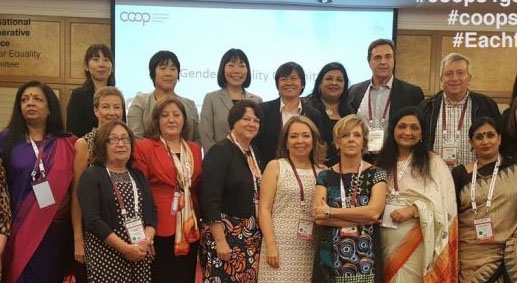Gender equality and women’s empowerment are challenges both within cooperatives, and in countries where cooperatives operate. Multiple barriers impose limitations on women, hindering their access to opportunities, often translating into legal restrictions that institutionalise women’s marginalisation. Eliminating those barriers that thwart gender equality is a critical target for cooperative action and a key priority for the International Cooperative Alliance and its member organisations, which aim for a gender-responsive implementation of the 2030 Agenda for Sustainable Development.
International Women’s Day represents an unmissable opportunity to mobilise global action to achieve gender equality for all women and girls. In 2020, the theme I am Generation Equality: Realizing Women’s Rights marks the 25th anniversary of the Beijing Declaration and Platform for Action which recognised the multiple benefits of cooperatives. Now, it is time for the UN and international cooperative development sector to increase and prioritise aid to key development actors that strengthen women’s economic, social and political empowerment.
Cooperative solutions go beyond business as usual in market economies and can help achieve the Leave no one behind-agenda contributing to “A decade of action and delivery”.
As economic actors, considering gendered norms, women continue to earn less, are more likely to partake in unpaid labour and more apt to be excluded from decent work. However, we must remind people that, when women establish or join cooperatives, they perform innovative labour activities, earning higher incomes and increasing their business performance and competitiveness. Joining cooperatives increases their decision-making in the household, and improves their participation and empowerment within community affairs – given that cooperatives, as people-centred enterprises focus on inclusive employment enabling at large women who suffer multi-faceted inequalities
Some examples show how this can be done.
In Spain, for example, women represent 54% of management and command positions in worker cooperatives;
In Italy the percentage of employed women, compared to the total, is 59% that means 1 million and 350 thousand women, with a good retention of employment even in times of crisis, women represent 50% of members and 24.8% of Board of Directors members.
In the search for strategies to promote the participation of women in decision-making spaces of the cooperative sector, gender violence was identified as an invisible barrier to the greater participation of women in Argentina. In 2019, the Argentine Confederation of Cooperatives (Cooperar) has taken the decision to implement a Protocol of Prevention of Gender Violence, which each entity can then take as an example and adapt it to its characteristics.
In Nepal, 40% of the board of directors in cooperatives are women and 51% of members in cooperatives are women (out 6.5 million members in the country)
In the Philippines, cooperatives participate in the implementation of SDGs in several areas with the assistance of the government, specifically, gender equality and the empowerment of women. The Philippine Plan for Gender-Responsive Development (1995-2025) mandated the implementation of gender and development in public and private sector, in accord with the provision of human rights guaranteed by the Constitution. The Cooperative Development Authority mandates all the registered cooperatives to mainstream gender and development.
In Nigeria, women constitute of 60% of the cooperative membership with 45% of the cooperative leadership being taken by women. The government and the cooperative movement promoted a Strategic Framework and national policy support and also registered the Nigeria Cooperative Women Alliance (NICOWA) to advocate for women participation in governance of all cooperative organizations and development of women cooperatives.
In Ethiopia, women make up to 42% of the cooperative membership and participate in different leadership positions in their cooperative thanks to an existing bylaw which states that there should be at least one female member in each and every cooperative management committee.
In times of conflict and post-conflict reconstruction, we see that the cooperatives are always among the first enterprises to be established.
Women are the first ones to join, restoring a fabric based on mutual trust and hope, addressing personal and communal needs such as freedom from violence and armed conflicts. Cooperatives are committed to fight any form of harassment and violence against women and their benefits in building peace and resilience have been recognised by key institutions at multiple levels including the ILO recommendation on the 2017 Employment and Decent Work for the Transition to Peace.
Moreover, considering that gender equity is increasingly seen as a pillar for sustainable economic development and broad social well-being, people-centered economic models which promote human rights of women and girls at all levels need to be reinforced, making the SDG5 a reality.
Cooperatives can be the tool to reduce the socio-economic injustices faced by women!
Executive Committee of the ICA Gender Equality Committee has two members from India– Nandini Azad, Chair of the ICA Asia Pacific Women’s Committee and Arti Bisaria, Women’s Empowerment Committee of NCUI (the National Cooperative Union of India). María Eugenia Pérez Zea, is the Chair of the ICA Gender Equality Committee.





















































